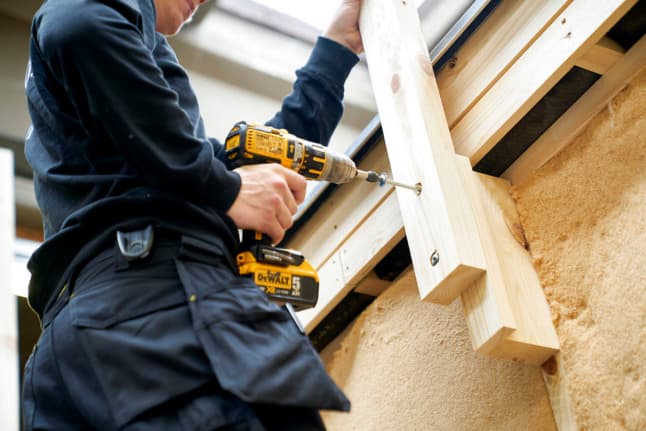Denmark scraps popular tax deduction for home improvements

A tax deduction for home improvements, the “håndværkerfradrag”, is to be scrapped in 2022 after parties agreed to end it in next year’s budget.
The government, along with its left wing allies Red Green Alliance, Social Liberals and Socialist People’s Party; and minor parties Alternative and the Christian Democrats, presented the 2022 budget on Monday, including an agreement to drop the home building subsidy.
Sofie Carsten Nielsen, leader of the Social Liberals, said “we are dropping the building subsidy that has ignited the already overheated housing and construction market”.
READ ALSO: Four ways to (legally) lower your tax bill in Denmark
The tax deduction will be removed from April 1st next year. Other tax deductions that can be applied for home services, including cleaning and childcare, are retained.
Tax subsidies for people who hire services in their homes, termed boligjobordningen, were broadened last year as part of government measures to support the economy during the coronavirus crisis.
The provision allowed for a higher tax deduction for the encompassed home services.
Demand for builders has since increased so dramatically that supply can no longer meet demand. As such, the parties behind the budget deal reason that the deduction is no longer needed.
Additionally, the Danish central bank, Nationalbanken, has warned that high demand could contribute to an overheating of the housing market.
Although the deduction was adjusted five years ago to favour green home improvements, the government’s allied parties still maintained they wanted to scrap it.
Nielsen said on Monday that the deduction has put Denmark’s building trade under strain.
“This is an economically responsible budget which also contains huge green decisions,” the Social Liberal leader said.
Finance Minister Nicolai Wammen said that the deduction would remain applicable to other trades, including cleaning, in order to prevent cash-in-hand arrangements.
“The biggest challenge we have in regard to the Danish service industry is in building and extensions. That’s why we are revoking the building element of the (subsidies),” Wammen said.
“But we are very concerned with keeping down cash-in-hand work in the service sector,” he added.
Comments
See Also
The government, along with its left wing allies Red Green Alliance, Social Liberals and Socialist People’s Party; and minor parties Alternative and the Christian Democrats, presented the 2022 budget on Monday, including an agreement to drop the home building subsidy.
Sofie Carsten Nielsen, leader of the Social Liberals, said “we are dropping the building subsidy that has ignited the already overheated housing and construction market”.
READ ALSO: Four ways to (legally) lower your tax bill in Denmark
The tax deduction will be removed from April 1st next year. Other tax deductions that can be applied for home services, including cleaning and childcare, are retained.
Tax subsidies for people who hire services in their homes, termed boligjobordningen, were broadened last year as part of government measures to support the economy during the coronavirus crisis.
The provision allowed for a higher tax deduction for the encompassed home services.
Demand for builders has since increased so dramatically that supply can no longer meet demand. As such, the parties behind the budget deal reason that the deduction is no longer needed.
Additionally, the Danish central bank, Nationalbanken, has warned that high demand could contribute to an overheating of the housing market.
Although the deduction was adjusted five years ago to favour green home improvements, the government’s allied parties still maintained they wanted to scrap it.
Nielsen said on Monday that the deduction has put Denmark’s building trade under strain.
“This is an economically responsible budget which also contains huge green decisions,” the Social Liberal leader said.
Finance Minister Nicolai Wammen said that the deduction would remain applicable to other trades, including cleaning, in order to prevent cash-in-hand arrangements.
“The biggest challenge we have in regard to the Danish service industry is in building and extensions. That’s why we are revoking the building element of the (subsidies),” Wammen said.
“But we are very concerned with keeping down cash-in-hand work in the service sector,” he added.
Join the conversation in our comments section below. Share your own views and experience and if you have a question or suggestion for our journalists then email us at [email protected].
Please keep comments civil, constructive and on topic – and make sure to read our terms of use before getting involved.
Please log in here to leave a comment.